Search
Viewing 2100 to 2115 of 3127 news
-

Launch of a distance learning strategy in times of Covid-19 in Uganda
Dorothy KYAMAZIMA | 27/10/2020
Given the global pandemic and its impact on the education system around the world, many actors have been quick to respond to the education crisis. In Uganda, Enabel has worked together with the Ministry of Education and Sports to develop and implement a distance learning strategy dubbed the “TTE Sandbox” to ensure the continuity of learning in the National Teachers' Colleges.Read more about the Sandbox project: https://www.enabel.be/story/even-times-covid-19-learning-shouldnt-wait
-

Lancement officiel du projet DEPOMI - Maroc
Meriem HILALI | 27/10/2020
Lancement officiel du projet « Déploiement des politiques migratoires au niveau régional (DEPOMI), le vendredi 23 octobre 2020 au siège de la Wilaya de l’Oriental à Oujda.Ce projet, financé par le Fonds Fiduciaire d’Urgence (FFU) de l’Union européenne, va permettre au Ministère Délégué chargé des Marocains Résidant à l’Etranger d’accompagner les régions partenaires des projets SoussMassa, BeniMellalKhénifra et Oriental d’intégrer la dimension de la migration dans les politiques et stratégies publiques aux niveaux national et régional. Le processus de régionalisation avancée est une opportunité pour mettre les régions au cœur de l’implémentation de la Stratégie Nationale d’Immigration et d’Asile et de la Stratégie Nationale au profit des Marocains Résidant à l’Etranger dans les régions partenaires du projet.La mise en œuvre du projet est confiée à Enabelen coordination avec tous les acteurs concernés par la thématique. A terme, le projet DEPOMI prévoit d’atteindre les résultats relatifs au renforcement des compétences des acteurs partenaires, de la gouvernance et la planification stratégique de la migration.Une feuille de route sur l'institutionnalisation de la dimension migratoire sera élaborée par région pour instaurer un mécanisme de concertation et de coordination des acteurs qui s’appuie sur l’intégration systématique de la migration dans les documents de planification stratégique régionale et locale. Par ailleurs, le projet prévoit également un partenariat avec les organisations de la société civile pour l’atteinte de certains résultats intermédiaires dans les trois régions cibles ainsi que la recherche-action grâce à une collaboration entre les universités marocaines et européennes. L’objectif de cette dernière est de créer de la connaissance, d’approfondir certains axes et de mettre à la disposition des régions toutes les données nécessaires pour mieux intégrer la migration dans son développement.
-

Ugandan teachers say what they think of the TTE Sandbox Strategy
Dorothy KYAMAZIMA | 27/10/2020
The Sandbox Strategy is transforming the teaching and learning process within the National Teachers' Colleges allowing them to adjust to digital technology but also ensure the continuity of learning. Here is in video what some teachers had to say about this strategy.Read more about the Sandbox project: https://www.enabel.be/story/even-times-covid-19-learning-shouldnt-wait
-

Au Mali, formation des femmes de Koulikoro en techniques de fabrication du fromage
Nènè TRAORE | 26/10/2020
Au Mali, la surproduction de lait en saison hivernale et durant la période de récolte entraînent des pertes financières pour les producteurs de lait. Afin d’éviter ces pertes, la valorisation du lait et sa transformation en fromage constituent un enjeu important pour la conservation des produits laitiers et leurs écoulements sur le marché.Malheureusement les techniques endogènes de fabrication de fromage ne sont pas maîtrisées par les femmes du cercle de Dioila malgré sa valeur marchande sur le marché et sa valeur nutritive pour les ménages agropastoraux. Enabel a initié une formation destinée à une dizaine de femmes membres de la fédération lait de Fana en techniques de fabrication de fromages sahéliens.L’objectif de cette formation étant de renforcer les capacités individuelles des membres de la fédération lait de la région de Koulikoro en matière de valorisation du lait.Cette action s’inscrit dans le cadre de la mise en œuvre du projet de renforcement des capacités qui accompagne la Fédération régionale lait de Koulikoro sur le développement de la filière lait. Grâce aux acquis de cette formation les femmes de la fédération de lait auront les capacités nécessaires pour former à leur tour les femmes des ménages pastoraux et agropastoraux, qui sont traditionnellement les vraies propriétaires de lait.Cela permettra ainsi de diversifier les sous – produits laitiers qu’elles pourront commercialiser sur le marché.
-

Socieux+ est à la recherche d'expert.e.s pour une mission de cadrage en Mauritanie
Sarah CARPENTIER | 22/10/2020
MAURITANIE – Mission de cadrage (2-28 novembre 2020) Titre : Renforcement des capacités de l’administration de l’emploi et de son service public Objectif général : Les capacités institutionnelles des institutions de l’emploi, du travail et de la protection sociale sont renforcées et consolidées Objectifs spécifiques : · Renforcement des capacités des services de l’Emploi et de l’administration de la DG Emploi ; · Renforcement du dispositif de gouvernance entre l’ANAPEJ, La Coordination Projets Emploi (CPE) et les guichets emploi sur tout le territoire Délivrables : Le principal résultat final de la mission de cadrage sera le plan de travail de formulation (WPFc) ou les plans de travail pour l’action ou les actions proposées. LeWPFc est basé sur le modèle de cadre logique pour la planification de projet utilisé par la Commission européenne dans sa coopération internationale. Il comprend les objectifs, les résultats et les produits livrables des actions proposées. En outre, un rapport de mission de cadrage (FcMR) est attendu à la fin de la mission. Ce rapport résume les conclusions et les recommandations de l’équipe de la mission sur la faisabilité et la mise en œuvre de l’action proposée, le cas échéant. Référence : 20-26/MRT/FFM Pour plus d’info, consultez: http://socieux.eu/wp-content/uploads/2020/10/2020-26-MAU_FFM_ToRFc_2020-10-17rev2-1.pdf
-
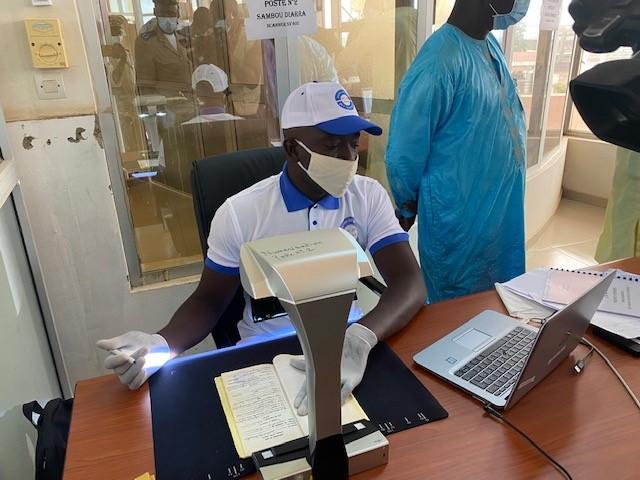
Plan d’archivage physique et numérique au Mali
Nènè TRAORE | 22/10/2020
A l’occasion de la 3ème édition de la journée Africaine de l’état civil, célébrée le 10 août 2020, le Ministre de l’Administration Territoriale et de la Décentralisation accompagné du représentant de l’UA, du représentant de l’UE et du Directeur National de l’Etat Civil, s’est rendu sur le site abritant la chaîne de numérisation et d’indexation des actes d’état civil à la Direction Nationale de l'Etat Civil (DNCEC).Depuis cette visite, deux autres chaines de numérisation ont été déployées. Une au sein du centre principal d’état civil de la Commune II et une seconde dans le centre d’état civil de la commune rurale de Sido.En prévision du passage à l’échelle, il est apporté un appui à tous les centres d’état civil de la Commune II, et prochainement au centre principal de Kayes : formation des agents d’état civil aux procédures d’archivage, fourniture de matériels d’archivage, état des lieux et archivage physique des documents d’état civil.
-
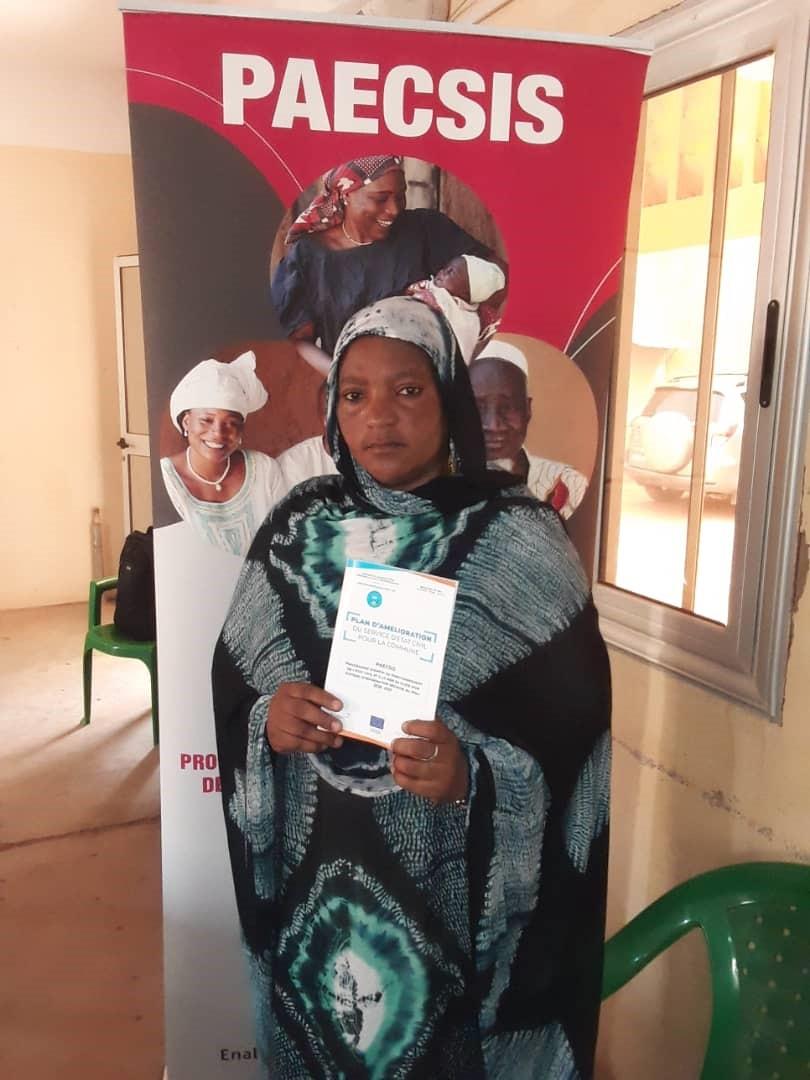
Vers de nouveaux centres d’état civil au Nord du Mali
Nènè TRAORE | 22/10/2020
Dans le cadre du projet de construction de centres d’état civil dans les 8 nouvelles communes des régions de Taoudenit (Foum-Elba, Achourat, Al-Ourche, Araouane, Boujbeha et Taoudénit), Gao (Almoustrate) et Kidal (Achibogho), le PAECSIS a organisé en juillet 2020, deux cadres de concertation à Gao et à Tombouctou.Ces cadres avaient comme objectifs de définir de manière concertée avec les principaux acteurs régionaux et locaux de ces communes, les modalités opérationnelles de la construction et de la mise en service de centres principaux d’état civil. A l’issue de ces concertations un plan d’action a été défini, il comprend la mise en œuvre des activités suivantes : l’indentification des différents sites de construction, la réalisation des études de faisabilités, la sélection des entreprises et la construction des centres d’état civil, l’équipement des centres, la sensibilisation des populations sur les faits d’état civil.
-
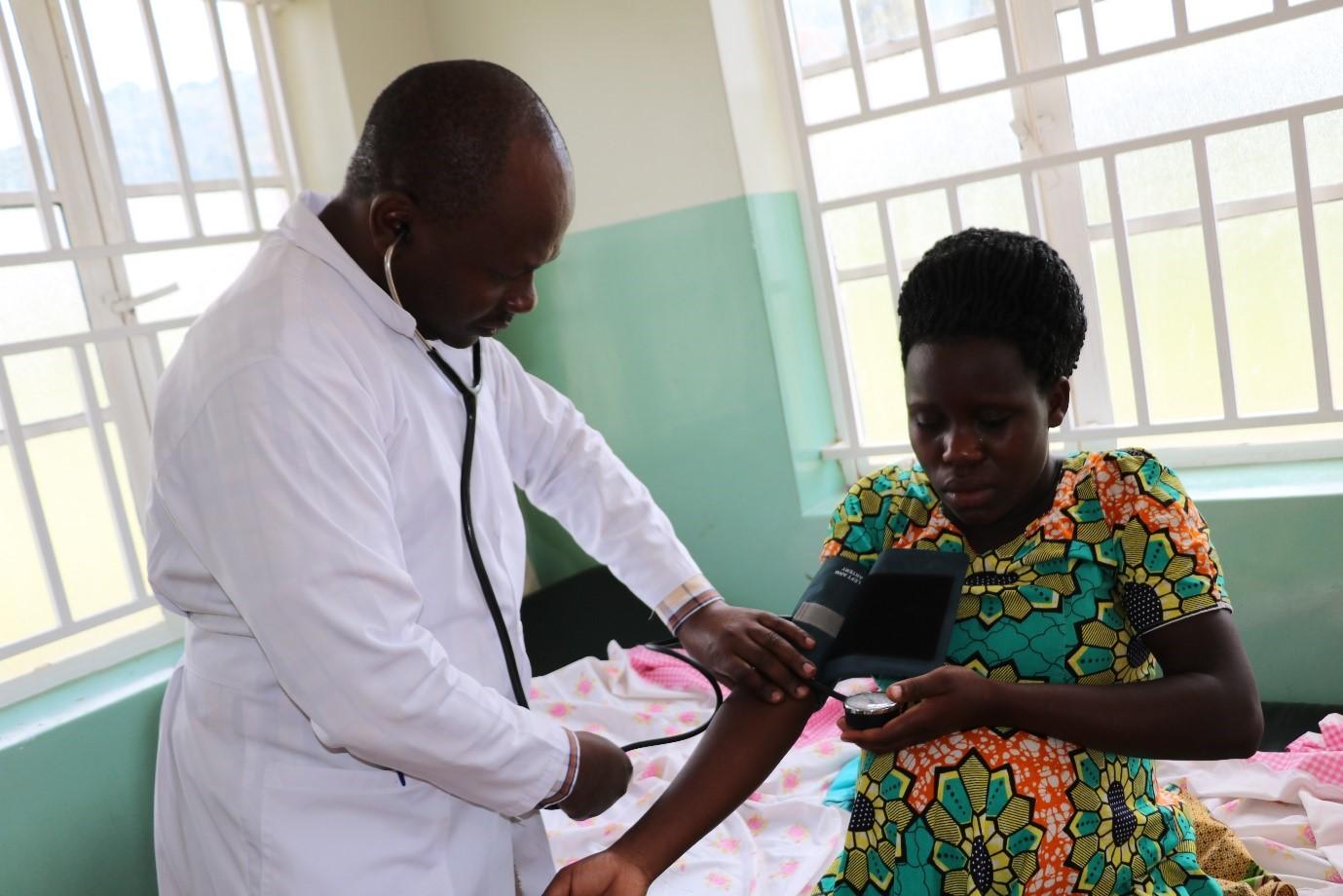
Quality low-cost health care services benefiting Uganda's Rwenzori and West Nile regions
William YEKA | 22/10/2020
52 years old Alfred Ocolla, has a kidney and heart problem. He would travel 80kms away from his home to Arua Regional Referral Hospital for routine check-ups. Sometimes, Ocolla would be referred to Lacor hospital in Gulu for oxygen. According to Dr Jammy Omara, the Medical Superintendent of Nyapea hospital, the ultrasound department which was closest to Ocolla was non-functional for 3 years due to lack of equipment. Hence, patients including Omara who sought for ultrasound services were referred to Arua. Today, several public health facilities are faced with similar challenges including poor infrastructure, human resource gaps and regular drug shortages. Besides, the high cost of health services especially at the private not-for-profit health facilities scared away many patients from seeking professional treatment thus resorting to self-prescription, sharing of medicine and sometimes use of herbs. To help change this situation, Enabel supplied the facility with a cardiography and x-ray machine. Today, because of the new machines Ocolla receives his routine check-ups at Holy Family Hospital, Nyapea located in his home area. Since 2016, Enabel has been implementing the National Results-Based Financing policy which provides for the extension of direct financial support to health facilities to enable them purchase equipment and other necessary items. The funds are however provided on condition that health facilities attain pre-determined targets. The organisation piloted this health service delivery model in 80 health facilities including Holy Family Hospital Nyapea. Dr Sarah Byakika, the Commissioner Planning, Financing and Policy at Uganda's Health Ministry, also the National Results-Based Financing Coordinator, says the approach was adopted by government to improve productivity and ensure access to quality health services for all. “No doubt the delivery of quality health care services especially to women and children in the two regions has improved,” Byakika said. According to the In-charge Warr Health Centre IV in Zombo district, Dr Imelda Kawambe, majority of the clients who seek services at the facility are women with labour complications and children. Flexibility in utilisation of fundsEnabel's Project Technical Officer Richard Musabe says the flexibility in utilisation of funds provided enabled beneficiary facilities to invest in critical areas including infrastructure and incentivizing of front line health workers. “For our case, we recruited additional 2 clinical officers and midwives but also enhanced staff salaries,” says Dr. Jammy Omara, the Medical Superintendent of Nyapea. For Maureen Kusemererwa, enrolled midwife Bundibugyo, the cash incentives given to staff were an extra motivation. “This motivated me to handle mothers kindly especially during pregnancy, delivery and after,” she said. 34-year old Harriet Kelike acknowledges the improvement in the quality of care at Moyo general hospital, another facility benefiting from the Results-based financing scheme. The mother of 2 says the last time she delivered her child at the facility, the baby was underweight. Kelike says the nurses closely monitored and counseled her until the baby weight increased to 2.5kgs, “that is when I was discharged,” the smiling Kelike says. Increased deliveries at lower health facilities Another deliberate effort of the project was to reduce maternal and child deaths by ensuring the quality of deliveries at HC III levels were done under the care of a skilled health worker. RBF support improved the quality of deliveries in the supported health facilities. According to the District Health Information System (DHIS), deliveries at the health centres increased to 64 percent compared to 49 percent at the start of the project. Reduced congestion in general Hospitals Investing in HC IIIs and IVs, Musabe says eased access to services since patients nolonger have to travel long distances in search of medication. This he says reduced the number of patients admitted at General Hospitals and HC IVs because lower-level health facilities are able to handle most cases without referral to the higher level health facilities. Better organised referrals Where referral is recommended, Dr. Byakika says prolonged delays have been eliminated because of the now efficient ambulance system. At Nyapea hospital for instance, the number of women coming for antenatal services increased partly due to referral from lower level facilities. The facility now carries out about 7 deliveries daily. Reduced user fees in private not-for-profit health facilities According to Robert Nyakana, Accountant Virika hospital in Rwenzori region, the reduced user fees led to an increase in the number of people seeking medical attention. “We used to get about 10 people per day but today we get more than 25 patients a day,” Nyakana said. Regina Kabasiita, a patient says the hospital is now affordable to low-income earners. Improved health supplies RBF focal person in Moyo, James Alule says previously medicine would be prescribed before testing, against standard procedure, leading to inappropriate drug use. The facility was however revamped and various testing equipment provided. Consequently, the number of patients increased from 80 to 450. The facility has also registered 10% revenue increase. Drug stock out was also tackled. Sr, Juliet Asiimwe, Administrator, Rwibale HC IV says, this was the norm at the facility, but then when the project started, the facility was given buffer funds to stock essential drugs. “Today, we get many clients coming here because they are sure they will get the medicine available,” says Asiimwe. Improved data and financial management Richard Musabe says funds were also invested in financial training and book keeping equipment to ensure up-to-date record keeping, proper data management and accountability. Dr Byakika confirms that the project was a stimulus for health facilities to understand and analyse their data and timeliness in reporting which has become a routine of keeping up-to-date data. While the Results based financing approach has been a game-changer in health service delivery, a lot still needs to be done to address poor infrastructure, human resource gaps, inadequate medical equipment, frequent drug shortages and low motivation of health workers if Uganda is to achieve universal health coverage by 2030.
-
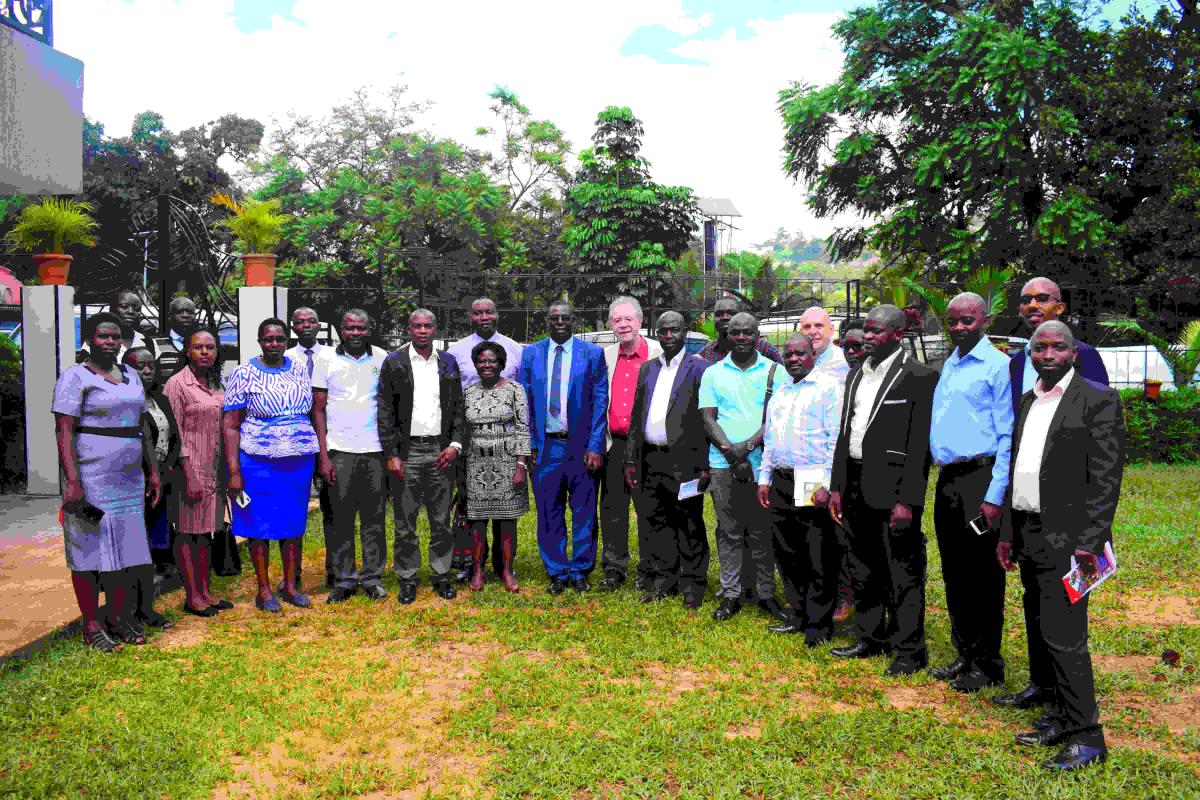
In Uganda, the Ministry of Education and Sports approves criteria for defining a TVET centre of excellence
Racheal AKELLO | 20/10/2020
Enabel in close collaboration with Development Partners, worked with the Ministry of Education and Sports (MoES) to establish and define the concept of a TVET Centre of Excellence (CoE). This exercise which transpired during last September was aimed at establishing standard criteria and framework for grading TVET institutions. Consequently, this would be used as a measure and a benchmark for raising standards in targeted TVET providers. Whereas the term Centre of Excellence has commonly been used by different stakeholders, there hasn’t been a common understanding of a “TVET Centre of Excellence.” In 2019, with the technical assistance of a renowned global TVET Expert, the Ministry of Education and Sports conducted a consultative process for key stakeholders in skills development arena resulting in a final report, criteria and rating for a TVET Centre of Excellence finalized early this year. This was recently approved and adopted by the Ministry of Education and Sports and Partners in September 2020.This concept will be piloted in a few selected public and private institutions and later rolled out to all TVET Institutions in the country. The Government of Uganda, with support from Development Partners is raising the standards of vocational education training providers to become Centres of Excellence. Enabel with support from the Belgian Government and the Irish Embassy is supporting 7 VTIs to become Centres of Excellence (CoE) in Albertine/Rwenzori and Karamoja regions respectively.These include Kasese Youth Polytechnic (KYP), St. Joseph’s Virika VTI, Uganda Technical College Kyema, Millenium Business School and St. Simon VTI Hoima for Albertine and Rwenzori; and Nakapiripiriti VTI and St. Daniel Comboni Naoi in Karamoja region. On the other hand, the Government of Uganda with funding from the World Bank under Uganda Skills Development Project (USDP), is supporting 4 Uganda Technical Colleges to become CoEs in four different trades. Other Development Partners like JICA, KOICA are equally supporting TVET institutions for the same purpose. These interventions are part of the larger government effort of accelerating and promoting the BTVET reform process foreseen in the Skilling Uganda Strategy and the recently adopted Technical Vocational Education and Training (TVET) Policy.
-
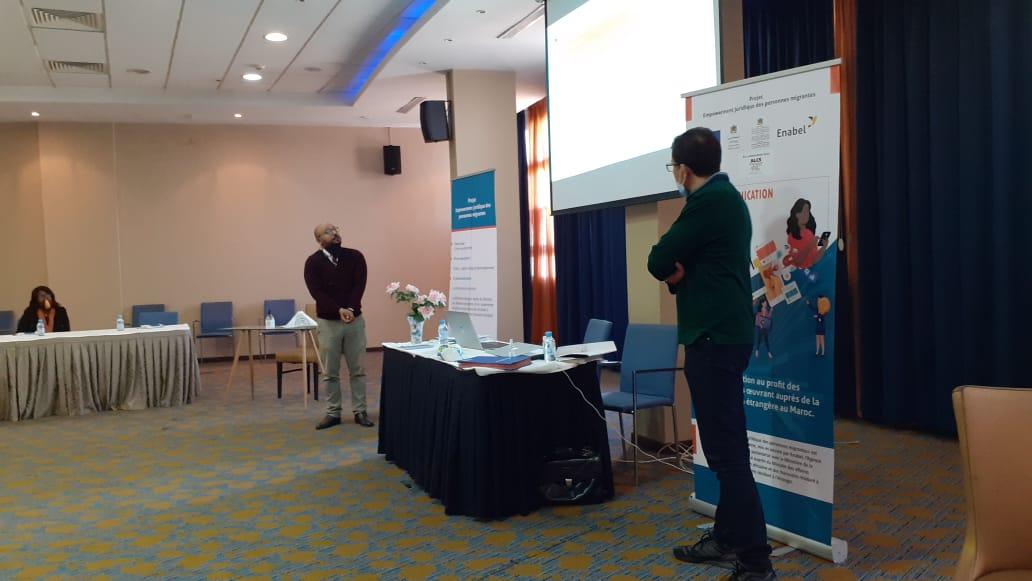
Mise en place d'un atelier en communication digitale - Maroc
Meriem HILALI | 20/10/2020
Les 19 et 20 octobre 2020, s'est déroulé un atelier sur la communication digitale au profit des associations œuvrant auprès de la population migrante dans la région de Tanger - Alhoceima. Cet atelier a eu lieu dans le cadre des activités du projet "Empowerement juridique des personnes migrantes", un projet qui vise à appuyer le travail des associations pour un meilleur accès aux droits pour les personnes migrantes, les demandeurs.ses d'asile et les réfugié.e.s. En partenariat avec ALCS - Association de Lutte Contre le Sida
-
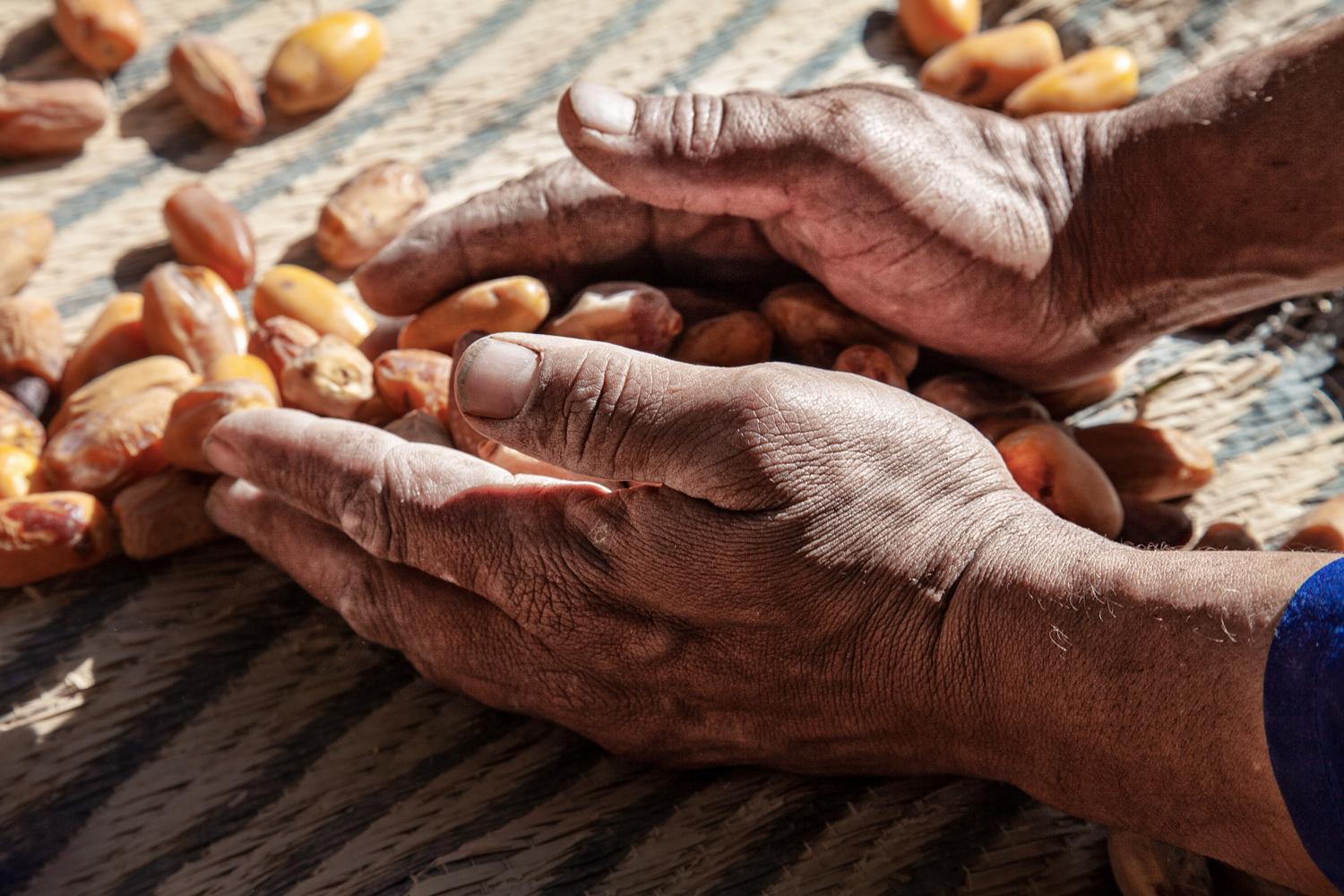
Au Maroc, l'entrepreneuriat féminin rural mis en avant: exemple de la coopérative Nissae Hannabou
Meriem HILALI | 20/10/2020
À Ksar Hannabou, au cœur de la région oasienne du sud-est du Maroc, une soixantaine de femmes participent au programme d'alphabétisation fonctionnelle mis en place par Enabel, l'ANDZOA, l'ONCA et l'ORMVA/TF dans le cadre d'un projet bilatéral de développement de la filière dattes.Tout en suivant des cours et en gérant leurs responsabilités familiales, elles arrivent à commercialiser prés de 100 kg d'infusion de dattes. Une expérience accompagnée depuis septembre 2019 par Enabel et ses partenaires grâce au projet de développement de la filière dattes.Découvrez-en plus via ce lien: https://spark.adobe.com/page/soNwBeTvAz2mS/?fbclid=IwAR2Pv65AbOK37JiX0depPWjxyoFLhflakIXBJ7maN_paFIA...
-

Amélioration des services d’état civil au Mali
Guido COUCK | 19/10/2020
Au Mali, le système d’état civil reste perfectible tant du point de vue de la collecte des données, de leur contrôle que de leur traitement.Conscient des défis et des progrès à réaliser, le gouvernement malien a adopté en juillet 2018 une stratégie nationale de l’état civil, visant à doter le pays d’un système efficace, exhaustif et sécurisé.L’Union Européenne s’est engagée, à travers la création de fonds fiduciaire d’urgence pour l’Afrique, à soutenir cette forte volonté politique.Le programme d’appui au fonctionnement de l’état civil et la mise en place d’un système d’informatisation sécurisé (PAECSIS) matérialise cette ambition.Le PAECSIS prévoit d’améliorer l’offre de service d’état civil à travers une approche ciblée dans un nombre limité de communes.Cette approche de proximité doit permettre l’élaboration de plans d’amélioration des services d’état civil (PASEC).
-
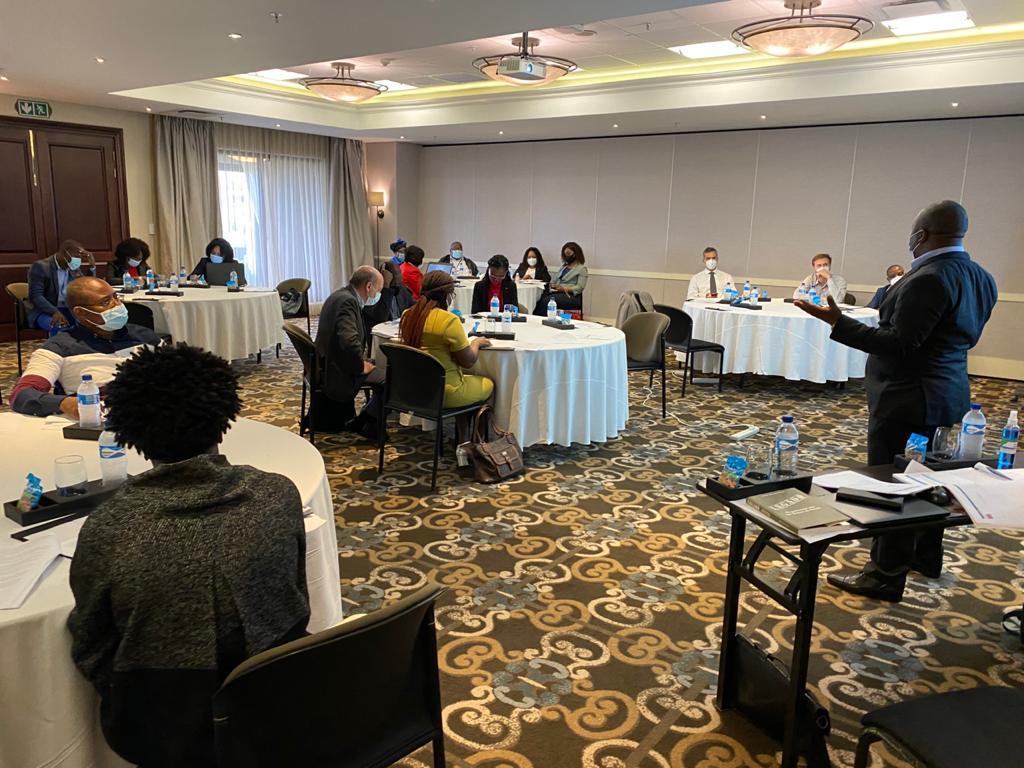
PEFA 2019: Technical level validation seminar of the preliminary report in Mozambique
Akila MUNIR | 16/10/2020
By: Jesse Waterschoot and Damiano Stella, Enabel Mozambique The Public Expenditure and Financial Accountability (PEFA) assessment of the Mozambican health sector was launched in March 2020 with a seminar. Since then, the consultants have gathered the necessary documentation for conducting their analysis and scoring the indicators. In brief, a PEFA is an evaluation of the Public Financial Management of a country or a sector. The objective of the current assessment is to obtain a diagnosis of the progress made by the Health Sector in Mozambique, by collecting and analyzing the data available between the period 2016-2018 and relevant elements of the year 2019. This evaluation will be the 3rd PEFA assessment of the Health Sector. A PEFA has 7 pillars, measured by several indicators. These indicators consist of one or more sub-indicators or dimensions. Those dimensions get a score, ranging from A (best practices) to D (worst practices). The score of an indicator is constituted by its different dimensions, either through their average, or the score of the lowest indicator. For more information about the methodology of a PEFA and the reason that lead to the decision to conduct a PEFA evaluation for Health Sector in Mozambique, see the following link: https://open.enabel.be/en/MOZ/2234/1028/u/pefa-2019-seminar-assessment-launch-and-workshop-on-mozambique-s-health-sector.html The consultants decided to use 23 indicators, the relevant ones for the sector. The field visits to the provinces of Sofala and Nampula were cancelled due to the Covid-19 circumstances and only one field visit to Gaza province took place. However, contacts and interviews were done remotely, so this had limited to no impact on the PEFA’s quality and content. Initially, the consultants conducted interviews with the different sector institutions and collected evidence for the evaluation. After that process, they gathered information from other relevant institutions, such the Ministry of Economy and Finance (MEF). Seminars are another important part of a PEFA evaluation. These are used to inform the relevant partners and familiarize them with the PEFA methodology as well as for confirming the information shared, the interpretation of the data and consequent scoring given to each dimension. In light of this, two seminars already took place; firstly, the PEFA launching seminar was held in March 2020 followed by the Technical Level Validation Seminar held on the 1st of October 2020. During the second seminar that took place in October 2020, the PEFA consultants presented a preliminary scoring report for discussion on the findings. The team leader, Andrew Lawson, could not be present due to the Covid-19 circumstances. The two locally based consultants, Mariam Umarji and Thomas Selemane, explained the relevance of the indicator to a sector analysis, followed by the reason of the scoring. In general, the Mozambican Health sector preliminary scores are low on the pillar of Budget Credibility (mostly D), Transparency of Public Finance (Mostly C and D) and Predictability and Control of the Budget Execution (Mostly C), but has good practices for the Budget Preparation Process (A) and Budget Classifications (B) [1]. An important note is that a PEFA review cannot be given one single score. The scores are an assessment of the distinctive pillars and dimensions and should not be summed up. After the overview on indicators, the focus of the seminar shifted towards the next steps. The PEFA scores are useful to gauge of the sector’s PFM system is working and it can signal the areas where reforms are needed. Therefore, the partners and consultants held a discussion on how these scorings can be improved, and which areas in the sector need to be improved. They identified ten PFM areas under the direct control of the Health sector that can be improved in the medium-term: (i) Internal Revenue, (ii) Management Accounts, (iii) Planning, (iv) Decision making process for Investments in Infrastructures, (v) SPO (Planning and Budgeting subsystem), (vi) Directorate of Planning and Cooperation, its organization and quality of the budget, (vii) Functional Classification and Service Delivery, (viii) Aid in-kind (ix) Decentralization, and (x) Transparency. The partners will provide their comments and additional documents on this preliminary PEFA, after which the final report will be concluded. [1] At the moment, no more details on the scoring can be given. The final scoring will be published when the report is finished.
-
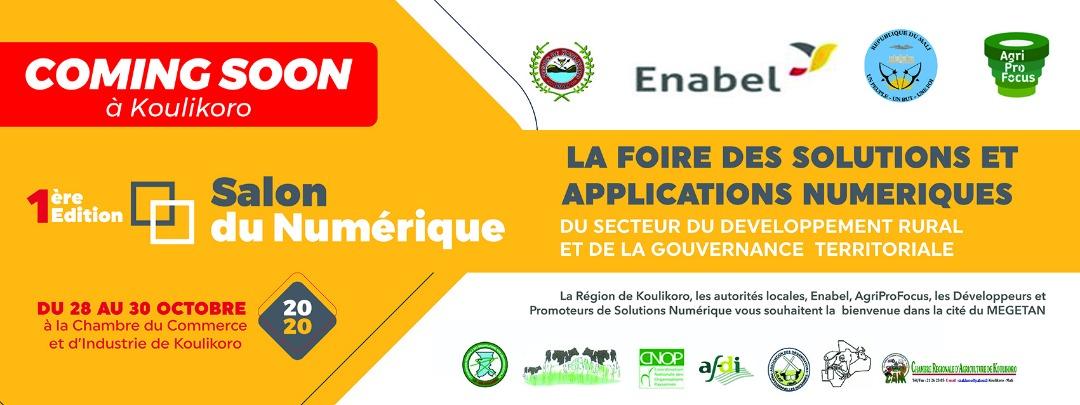
Mali: Lancement de la première foire des solutions et applications numériques à Koulikoro
Nènè TRAORE | 16/10/2020
L’intervention de renforcement des capacités, dans sa dynamique d’appui aux acteurs étatiques et non-étatiques dans l’exercice de leurs rôles spécifiques a engagé un partenariat avec un réseau international multipartite qui fait de l’agrobusiness un outil de développement, AgriProFocus.Cette agence a pour but de développer des alliances stratégiques par les acteurs publics et privés afin d’entreprendre des initiatives novatrices relatives à la digitalisation dans un contexte de promotion d’une croissance économique durable et inclusive. AgriProFocus a entrepris un mapping des solutions et applications numériques du secteur du développement rural et de la gouvernance territoriale dans la période du 15 juillet au 31 août 2020.Aux termes de l’exercice vingt-deux solutions ou applications numériques ont été répertoriées dans les secteurs du développement rural et de la gouvernance territoriale dans la région de Koulikoro et le district de Bamako.Ces applications numériques sont développées essentiellement par des compagnies de téléphonie, des startups et des incubateurs. L’analyse de la problématique du développement et de la fonctionnalité de ces applications numériques a mis à nu beaucoup de contraintes/défis. Dans la perspective de trouver des solutions aux défis identifiés, l’étude a formulé des recommandations dont leur mise en œuvre nécessite l’engagement de tous les partenaires et acteurs du numérique : autorités politiques, partenaires au développement, concepteurs/développeurs des solutions et applications numériques. De ce fait, l’organisation d’une foire du numérique s'est imposé comme une nécessité afin de : - Créer un cadre de concertation entre développeurs et utilisateurs de solutions numériques ; - Faire un plaidoyer à la faveur de la promotion de solutions et applications numériques ; - Diagnostiquer la problématique du développement et de l’utilisation des solutions et applications numériques ; - Faire des recommandations pertinentes pour un développement et l’utilisation judicieux des solutions et applications numériques dans les secteurs du développement rural et de la gouvernance territoriale. C’est dans ce cadre que se tient la première foire des solutions et applications numériques à Koulikoro du 28 au 30 octobre 2020.
-

Première sortie des navires de 300 mètres de long au Port de Cotonou
Reece-hermine ADANWENON | 14/10/2020
Depuis le 17 juillet 2020, des navires de 300 m accostent au Port Autonome de Cotonou.L’arrivée de ces navires permet de réduire considérablement les délais de transport des marchandises, grâce à la réduction du nombre d’escales intermédiaires et la limitation des ports de transbordement ; l'accroissement des cargaisons traitées ; le renforcement de la renommée du Port de Cotonou sur le plan International et un nouveau positionnement sur le marché maritime international.Enabel a formé des pilotes et capitaines de remorqueurs dans les simulateurs du Port d’Anvers pour l’accostage et l’appareillage des navires de dernière génération. Jusqu’en juillet 2020, le Port de Cotonou accueillait des navires de moins de 300 m de long, bien qu’ayant la capacité d’en accueillir de plus grandes tailles. Cela s’explique par un manque d’expertise nationale en la matière.Le projet d’appui au secteur (para)portuaire (PASPort) d’Enabel au Bénin a dès lors intégré dans son package d’accompagnement du Port Autonome de Cotonou, entre juin 2019 et février 2020, un parcours de formation au profit du personnel nautique (8 pilotes, 8 capitaines de remorqueurs et 15 matelots). Ainsi, 31 agents ont reçu une formation au Port d’Anvers par des experts du Port International d’Anvers (PAI). Les pilotes et capitaines de remorqueurs ont travaillé sur des simulateurs sur lesquels le modèle du Port de Cotonou a été installé, décrivant ainsi un environnement simulé et imitant la réalité de la meilleure façon possible.Tous les agents ont bénéficié d’un suivi post formation par les instructeurs/experts PAI. Ceci s’est conclu au cours des mois de juillet et août 2020 par des tests grandeur nature sur cinq navires de 300 m de long et en moyenne de 48 m de large. Il s’agit d’une grande première pour le Bénin qui surplante à présent son voisin de l’Est qui, pour le moment n’accueille que des navires d’une capacité de 265 m de long.Une cérémonie officielle d’accostage d’un de ces géants des océans, le Maersk Sarat, a eu lieu dans la matinée du 10 août 2020 au Bénin Terminal avec la présence du représentant du Ministre des Infrastructures et des Transport, l’Ambassadeur de Belgique, le Consul Honoraire du Danemark, le Président du Conseil d’Administration du Port Autonome de Cotonou (PAC), le Président Exécutif de Bolloré Transports et Logistiques Bénin, le Président de la Chambre de Commerce et d’Industrie du Bénin, le Directeur Général du PAC, la Directrice Générale du Groupe Maersk Lines au Bénin, les représentants de l’association des consignataires des agents maritimes du Bénin et une représentante de PASPort. Quelle plus-value pour le Bénin ? L’arrivée des navires de cette taille va désormais considérablement réduire les délais de transport des marchandises, grâce à la réduction du nombre d’escales intermédiaires et la limitation des ports de transbordement. En effet, ces types de navires portent des charges brutes estimées à plus de 120.000 tonnes et sont à même de transporter environ 9000 TEUs (conteneurs équivalent à 20 pieds).
